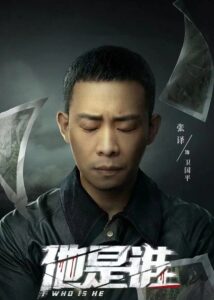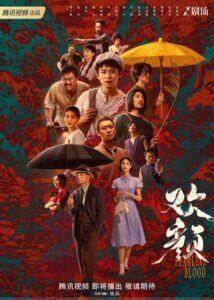Be Reborn Episode 1 Recap
> Be Reborn Recap
A theft occurred at the Qingcheng University Art Gallery. The stolen painting, "Water Lily," a masterpiece by the Republic of China painter Li Chengyi, had been previously stolen in the late 1980s and was only returned to public view in 2001 after an anonymous collector donated it to the museum.
Zhuang Wenjie, a senior law student at Qingcheng University with a deep passion for painting, especially "Water Lily" which he had copied seventeen times, discovered the painting on display had been swapped for a counterfeit after an 18-second power outage. He immediately reported it to the security staff, but a physical altercation ensued when they did not believe him, leading them to call the police. Criminal Investigation Department Captain Luo Jian and his team began a meticulous investigation.
Initial forensic examination of the scene revealed that the dozens of footprints belonged to museum staff and visiting students, with no signs of external intruders. When Luo Jian questioned Zhuang Wenjie, the student explained that the authentic "Water Lily" was painted from the edge to the center, with leaf veins outlined as the paint was drying, whereas the fake exhibited the opposite technique.
He also pointed out a one-centimeter deviation in the scroll's hanging position and suspected the thief used a four-way hook to switch the paintings. When Luo Jian questioned Zhuang Wenjie about his alibi for the night of the theft, Zhuang Wenjie stated he was sleeping at a rented apartment he lived in off-campus, but had no one to corroborate his alibi. Officer Pang Dazhi, however, considered Zhuang Wenjie the prime suspect.
Pang Dazhi cited a past incident where a classmate's laptop was stolen from their dorm and later returned. Although there was no concrete evidence or surveillance footage in the corridor, and Zhuang Wenjie denied involvement, he was the only one observed entering and exiting the room during that period, leading to lingering suspicion among his classmates. Pang Dazhi further revealed Zhuang Wenjie’s family history, noting that his great-grandfather and grandfather were infamous bandits.
Twelve years prior, his father, Zhuang Yaobai, along with an accomplice named Ding Shenghuo, stole the famous painting "Luoshen." Zhuang Yaobai's car subsequently crashed into a river during his escape, and though his body was never recovered, he was presumed dead. During their technical analysis, the police discovered the name "Zhuang Wenjie" written on the counterfeit "Water Lily" using invisible ink, only visible with a polarizer.
Despite this incriminating detail, Luo Jian, acknowledging the discrepancy in the handwriting, decided not to detain Zhuang Wenjie, as the signature closely resembled his but was not an exact match. He chose to speak with Zhuang Wenjie away from the station, urging him to disclose any suspicious people or events he might have encountered. Zhuang Wenjie, however, denied seeing anything unusual, concealing the fact that he had recently found his window at home open.
Luo Jian, aware of Zhuang Wenjie's challenging past after losing both parents (his mother to illness, his father in the river accident), assured him that his family background did not prejudice the investigation. He warned Zhuang Wenjie to be cautious, as ill-intentioned individuals might target him because of his father's past. Luo Jian concluded their conversation with a profound piece of advice: "To truly escape the darkness, one must strive to stand in the light."
Meanwhile, Zhuang Wenjie’s girlfriend, Lin Zhiyue, firmly believed in his innocence but was worried about the rumors. When she confronted him, he responded with coldness, stating he didn't care what others thought, which left her perplexed. Later, Zhuang Wenjie's good friend, Fatty Sun, expressed concern about the rumors circulating in their department regarding Zhuang Wenjie's alleged theft. Zhuang Wenjie, unfazed, reassured him that the truth would eventually come out.
Luo Jian, accompanied by officer Liao Shuang, revisited the Qingcheng University Art Gallery. Their investigation uncovered a section of ceiling glass directly above where "Water Lily" had hung that appeared to have been recently tampered with. They also found surveillance footage from the night of the theft with an 18-second blank segment. This blank segment coincided with an 18-second power outage confirmed by the gallery's security staff, which was attributed to the system switching to a backup power supply.
The police, however, suspected deliberate interference caused the surveillance system's protective shutdown, as it operated on an independent power source. The team, using a four-way hook as Zhuang Wenjie had suggested might have been used, simulated the theft, demonstrating that the painting could indeed have been stolen and replaced within the 18-second window, highlighting the precision and coordination required.
Driven to prove his innocence and uncover the truth, Zhuang Wenjie sought out Luo Jian, requesting another look at the fake painting. He explained his extensive experience with "Water Lily," having copied it seventeen times and discussed techniques with other artists online. He believed that by closely examining the counterfeit, he could deduce information about the forger. Despite Pang Dazhi's skepticism, Luo Jian agreed and invited art expert Teacher Fang to assist.
Upon examining the painting, Zhuang Wenjie suggested the forger might have used a projector to trace the original onto Xuan paper, then copied it, noting the remarkable color accuracy despite potential issues with projectors. Teacher Fang initially considered high-tech printing but found no ink reflection. He then detected the distinct smell of Xukang grass, a plant pigment historically used in Thangka painting to enhance richness and dimension.
Zhuang Wenjie quickly identified this as a characteristic of street artists who often use Xukang grass to boost color saturation in portraits, employing traditional methods as a gimmick to attract customers. Teacher Fang agreed with Zhuang Wenjie's theory, noting the direct and decisive brushwork on the fake was typical of street artists rather than master painters like Li Chengyi.
Following this lead, Luo Jian interviewed street artists, discovering that a painter known as "San" (Ma San) was renowned for his landscape work and had been absent from his usual spot for several days due to a "big gig." Luo Jian located Ma San and presented him with a picture of "Water Lily" on his phone. Ma San immediately panicked and attempted to flee but was quickly apprehended.
At the station, Ma San confessed that a young man, who introduced himself as "Wenjie," had contacted him by phone about a month prior.
This mysterious individual offered a substantial sum to copy "Water Lily" and provided a bag containing a cash deposit, traditional materials for a scroll painting (rollers for the top and bottom, raw Xuan paper, paraffin wax, and Shu brocade—all old, Republic of China-era items), and specifically requested that the name "Zhuang Wenjie" be signed on the finished painting using invisible ink.
Ma San was instructed to dispose of the phone after the job, but he kept it, only discarding the SIM card, and gave the phone to his girlfriend. Returning home from school, Zhuang Wenjie found an item he had placed on his door was undisturbed. Reassured, he entered, only to be surprised by three strangers in his house.














